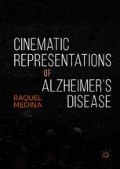Abstract
The introduction gives an outline of the origins of the book and of the author’s interest in representations of dementia (particularly of Alzheimer’s disease) across different cultures. It presents the research questions and the aims of the study, as well as a brief description of the topics covered in each chapter.
Access this chapter
Tax calculation will be finalised at checkout
Purchases are for personal use only
Bibliography
Alzheimer’s Disease International. n.d. The Global Voice on Dementia. Accessed October 29, 2017. https://www.alz.co.uk/research/statistics.
Basting, A.D. 2009. Forget Memory: Creating Better Lives for People with Dementia. Baltimore: John Hopkins University Press.
Behuniak, S.M. 2011. “The Living Dead? The Construction of People with Alzheimer’s Disease as Zombies.” Ageing and Society 31 (1): 70–92.
Bitenc, R.A. 2012. “Representations of Dementia in Narrative Fiction.” In Knowledge and Pain, edited by E. Cohen, L. Toker, M. Consonni, and O.E. Dror, 305–329. Amsterdam: Rodopi.
Buñuel, L. 2003. My Last Sigh. Minneapolis: University of Minnesota Press.
Castro, J. 2005. Los cuerpos oscuros. Madrid: Hiperión.
Chivers, Sally. 2011. Silvering Screen: Old Age and Disability in Cinema. Toronto: University of Toronto Press.
———. 2013. “Seeing the Apricot: A Disability Perspective on Alzheimer’s in Lee Chang-dong’s Poetry.” In Different Bodies: Essays on Disability in Film and Television, edited by M.E. Mogk, 65–73. Jefferson, NC: McFarland & Company.
Cohen-Shalev, A., and E. Marcus. 2011. “Lifting the Lid of Pandora’s Box: Alzheimer’s Disease in the Cinema.” Accessed October 12, 2017. http://www.interdisciplinary.net/wpcontent/uploads/2011/08/shalevhpaper.pdf.
———. 2012a. All Over and Done with Indeed? Picturing Alzheimer’s Disease in Recent Films. Haifa: University of Haifa.
———. 2012b. “An Insider’s View of Alzheimer: Cinematic Portrayals of the Struggle for Personhood.” International Journal of Ageing and Later Life 7 (2): 73–96.
Gravagne, P.H. 2013. The Becoming of Age: Cinematic Visions of Mind, Body and Identity in Later Life. Jefferson: McFarland & Company.
Halbwachs, M. 1992. On Collective Memory. Chicago: Chicago University Press.
Medina, R. 2012. “Donde impere el olvido: poesía y Alzheimer en Los cuerpos oscuros de Juana Castro.” Revista Canadiense de Estudios Hispánicos 36 (6): 541–561.
———. 2013a. “Alzheimer’s Disease, a Shifting Paradigm in Spanish Film: ¿Y tú quién eres? and Amanecer de un sueño.” Hispanic Research Journal 14 (4): 356–372.
———. 2013b. “From the Medicalisation of Dementia to the Politics of Memory and Identity in Three Spanish Documentary Films.” Ageing and Society 30 (10): 1688–1710.
Nora, P. 1989. “Between Memory and History: Les Lieux de Mémoire.” Representations 26 (Special Issue: Memory and Counter-Memory): 7–24.
Ricoeur, P. 1994. Memory, History, Forgetting. Translated by Katheleen Blamey. Chicago: Chicago University Press.
Sánchez, M. 1994. “El mal de Alzheimer será la epidemia del siglo XXI, según los expertos.” elpais.com. January 31. Accessed October 29, 2017. https://elpais.com/diario/1994/01/31/sociedad/759970811_850215.html.
Swinnen, A. 2016. “Healing Words: A Study of Poetry Interventions in Dementia Care.” Dementia 15 (6): 1377–1404.
Zeilig, H. 2013. “Dementia as a Cultural Metaphor.” The Gerontologist 20 (3): 1–10.
Zimmermann, M. 2017. The Poetics and Politics of Alzheimer’s Disease Life-Writing. London: Palgrave Macmillan.
Filmography
A Moment to Remember. Directed by John H. Lee. South Korea: CJ Entertainment, 2004.
A Second Childhood. Directed by Pupi Avati. Italy: Duea Film, 2010.
A Separation. Directed by Asghar Farhadi. Iran: Asghar Farhadi Productions, 2011.
A Song for Martin. Directed by Bille August. Sweden: Film i Väst, 2001.
Amour. Directed by Michael Haneke. France, Les Films du Losange, 2012.
Awaking from a Dream. Directed by Freddy Mas Franqueza. Spain: Terra a la Vista S.L., 2008.
Away from Her. Directed by Sarah Polley. Canada: Foundry Films, 2006.
Black. Directed by Sanjay Leela Bhansali. India: Applause Bhansali Productions, 2005.
Bucharest, the Lost Memory. Directed by Albert Solé. Spain: Bausan Films, 2008.
Cortex. Directed by Nicolas Boukhrief. France: Les Films du Worso, 2008.
Flying. Directed by Brenda Vanegas. El Salvador: Crowdfunding, 2018.
Head Full of Honey. Directed by Til Schweiger, Lars Gmehling. Germany: Barefoot Productions, 2014.
Iris. Directed by Richard Eyre. UK: BBC, 2001.
Mai. Directed by Mahesh Kodiyal. India: AMG Worldwide Entertainment, 2013.
Memories of Tomorrow. Directed by Yukihiko Tsutsumi. Japan: ROAR, 2006.
Old Cats. Directed by Pedro Peirano and Sebastián Silva. Chile: Elephant Eye Films, 2010.
Pandora’s Box. Directed by Yesim Ustaoglu. Turkey: Ustaoglu Film Yapim, 2008.
Poetry. Directed by Chang-dong Lee. South Korea: UniKorea Pictures, 2010.
Remember. Directed by Atom Egoyan. Canada: Serendipity Point Films, 2015.
Son of the Bride. Directed by Juan José Campanella. Argentina: Instituto Nacional de Cine y Artes Audiovisuales, 2001.
Still Alice. Directed by Richard Glatzer and Wash Westmoreland. USA: Lutzus-Brown, 2014.
Swimming. Directed by Carla Subirana. Spain: Benecé Produccions, 2008.
The City of No Limits. Directed by Antonio Hernández. Spain: Icónica S.A., 2002.
The Good Herbs. Directed by María Novaro. Mexico: Axolote Cine, 2010.
The Iron Lady. Directed by Phyllida Lloyd. UK: Pathé, 2011.
The Memory of a Killer. Directed by Erik Van Looy. Belgium: MMG Film & TV Production, 2003.
The Notebook. Directed by Nick Cassavetes. USA: New Line Cinema, 2004.
The Savages. Directed by Tamara Jenkins. USA: Fox Searchlight Pictures, 2007
Welcome to Verona. Directed by Suzanne Osten. Denmark: Filmlance International AB, 2006
Wrinkles. Directed by Ignacio Ferreras. Spain: Cromosoma TV Produccions, 2011
You, Me and Us. Directed by Ajay Devgan. India: Ajay Devgan Films, 2008.
Author information
Authors and Affiliations
Corresponding author
Copyright information
© 2018 The Author(s)
About this chapter
Cite this chapter
Medina, R. (2018). Introduction. In: Cinematic Representations of Alzheimer’s Disease. Palgrave Macmillan, London. https://doi.org/10.1057/978-1-137-53371-5_1
Download citation
DOI: https://doi.org/10.1057/978-1-137-53371-5_1
Published:
Publisher Name: Palgrave Macmillan, London
Print ISBN: 978-1-137-53370-8
Online ISBN: 978-1-137-53371-5
eBook Packages: Literature, Cultural and Media StudiesLiterature, Cultural and Media Studies (R0)

